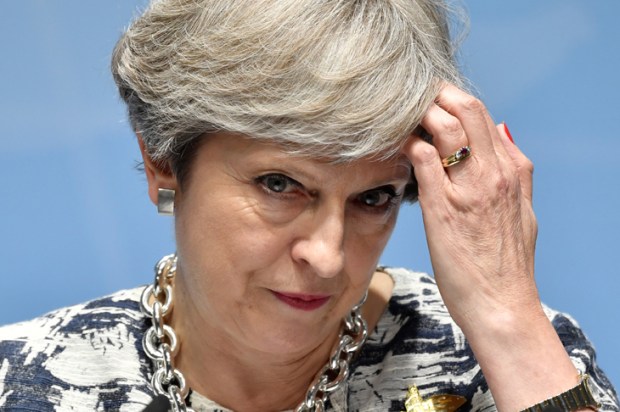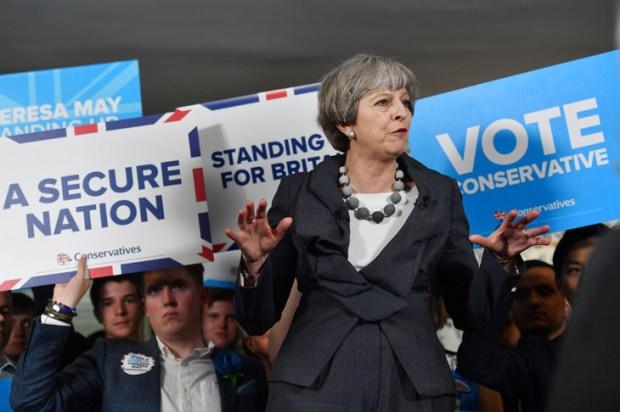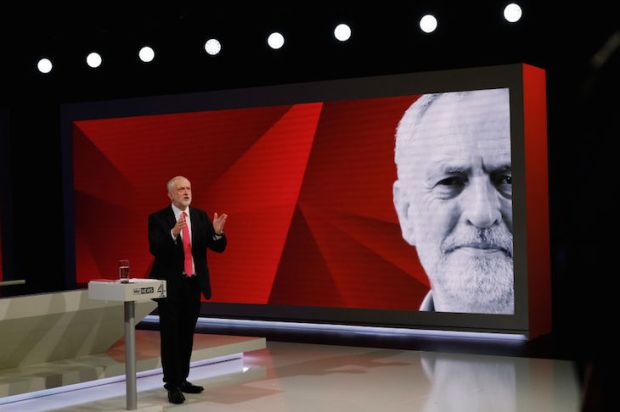It is not what Robert Mugabe would do. Calm down. These are ‘spiv Robert Mugabe antics’, said the Tory backbencher Nigel Evans, of the government’s alleged £9 million mailshot making the case for staying in the European Union. But no. They aren’t.
If David Cameron was behaving like Robert Mugabe, then he wouldn’t just be sending a leaflet to your house. He’d be sending a gang of thugs to your house, who all claimed to have fought in the second world war and yet had an average age of about 22, and then they’d come into your house and make you leave your house, and say it was their house. And Cameron would say, ‘Yes, it is their house,’ and the High Court would say ‘No it isn’t,’ and Cameron would either ignore the High Court altogetaher or call it a racist. I’m just saying. It’s important to get these things in perspective.
Given the farce of Greece, I daresay it would have been perfectly possible for Zimbabwe to have joined the EU and indeed the euro sometime around 2001, provided Goldman Sachs had been on hand to do the figures. A lucky escape for all of us. Had it, though, and were it now holding a referendum about whether it ought to leave, then I’m not sure that Robert Mugabe would have given his political opponents free rein to disagree with him while remaining in his cabinet. Rather, on past form, I suspect he might have massacred 20,000 of them and then spent 35 years denying it. Look, I don’t mean to go overboard, but I hope you’re getting the message. David Cameron on the EU: not as bad as Mugabe.
In fact, when it comes to the EU, Cameron is behaving with conciliation to the point of feeble deference, and it’s a measure of the sheer foaminess of his opponents that they’ve managed to convince themselves of the opposite. According to John Redwood, the leaflet is ‘an abuse of public money’ and ‘an insult to electors’ and is going to drive more people to vote ‘leave’, anyway. In which case, John, it’s a little hard to see what you’re complaining about.
The government did the same in Scotland in 2014, during the referendum on whether Scotland should leave the UK, because it was the government’s stated policy — on which they had been elected — that Scotland shouldn’t. Scottish nationalists did, indeed, make a small fuss at the time, but shouldn’t have done, as the Scottish government was simultaneously publishing its own white paper on why independence was a good idea. Which was, in turn, the basis on which they had been elected. Likewise, in 1975, having pledged in his manifesto to renegotiate Britain’s membership of the EEC and then hold a referendum, Harold Wilson did so, and sent out a leaflet. Are we seeing a theme?
This is like that. Cameron was elected on a promise to renegotiate our membership today, and then to hold a referendum about it. You may feel his renegotiation was feeble, as indeed do I, but that’s hardly the point. It’s his, and thus his government’s, and thus it’s hardly odd for that government to try to sell it. Never has he pretended to be neutral, nor should he, because he isn’t. Allowing dissent in cabinet was an expedient act of weakness, but that dissent does not indicate a government on the fence. Merely some people in it, who disagree with it and are fortunate enough not to be expected to resign. None of this is complicated.
Really everybody knows all of this. They just pretend. There are credible arguments for leaving the EU, I suppose, but it’s terribly revealing how much more comfortable advocates of that position are when they have the opportunity to fabricate small-scale procedural fights like this instead. It is as if for some reason they are keen to make the coming referendum appear to be about almost anything other than that which it is actually is.
House of low achievers?
Anyway, tax returns. I’m all for MPs having to publish them. Given the existence of the register of members’ interests, it ought not to make any difference anyway.
Alan Duncan got a flaming the other day for suggesting that tax transparency risked seeing the Commons ‘stuffed full of low achievers’, without ‘a hint of wealth in their lives’. Obviously this was crass, because wealth and achievement do not go hand in hand. Policemen are not inherently low achievers, for example. Nor playwrights. Nor soldiers. Nor vicars. Nor even MPs.
Had he spoken instead of the potential for wealth, he might have been on to something. Or to put that another way, however much they currently earn, it is very easy to imagine that both David Cameron and George Osborne could be earning as much in other walks of life. I doubt that’s purely down to their backgrounds, much as they will have helped. The same was clearly true of Ed Balls, for example. And Gordon Brown. I rather think it might be true of John McDonnell.
Only it’s not true of all of them. In what other capacity could Boris Johnson possibly rival the half million-ish he takes home in his combined capacity as a hack and a politician? I mean, he’s not going to be the CEO of Deutsche Bank, is he? Likewise Jeremy Corbyn. By temperament as much as ability, what could he have done, in another life, and even one more privileged, which would have allowed him to rival the salary of an MP? I can see him as an angry history teacher in a public school, I suppose. A kindly, overpaid zookeeper. A dentist of last resort. Other than that, I’m stumped.
Got something to add? Join the discussion and comment below.
Get 10 issues for just $10
Subscribe to The Spectator Australia today for the next 10 magazine issues, plus full online access, for just $10.















Comments
Don't miss out
Join the conversation with other Spectator Australia readers. Subscribe to leave a comment.
SUBSCRIBEAlready a subscriber? Log in